A Better World Through Food:
Plant-Based Meats
Cathy Teng / photos Jimmy Lin / tr. by Scott Williams
October 2022

A bowl of “beef” noodle soup made with a plant-based meat from Taiwan.
In Disney’s The Lion King, the runaway lion cub Simba meets Timon and Pumbaa, and then embarks on his hakuna matata (“no worries”) journey. When hunger eventually drives him to take a few steps down the food chain, Simba tries a caterpillar, lifting an eyebrow as he chews and remarking with surprise: “Slimy yet satisfying.”
Similarly, the protein we need to survive doesn’t come only from animals, but also from insects and even plants. In fact, plant-based meat substitutes created from plant proteins are both a new source of sustenance and a means to combat global warming.
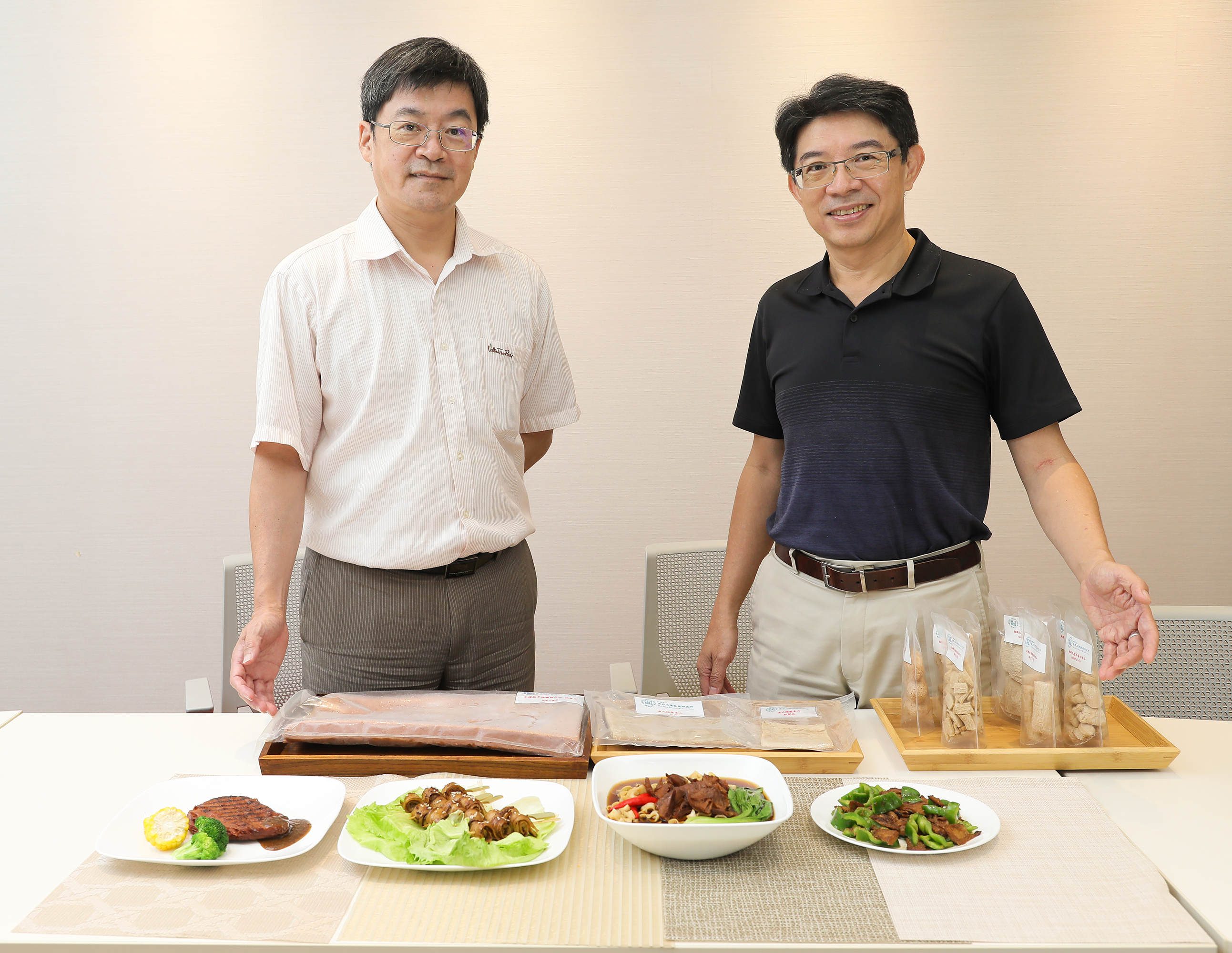
The Food Industry Research and Development Institute’s Hwang Sam-long (left) and Chang Yu-sheng (right) are optimistic about the outlook for Taiwan’s plant-based meat technology and the plant-based meat market as a whole.
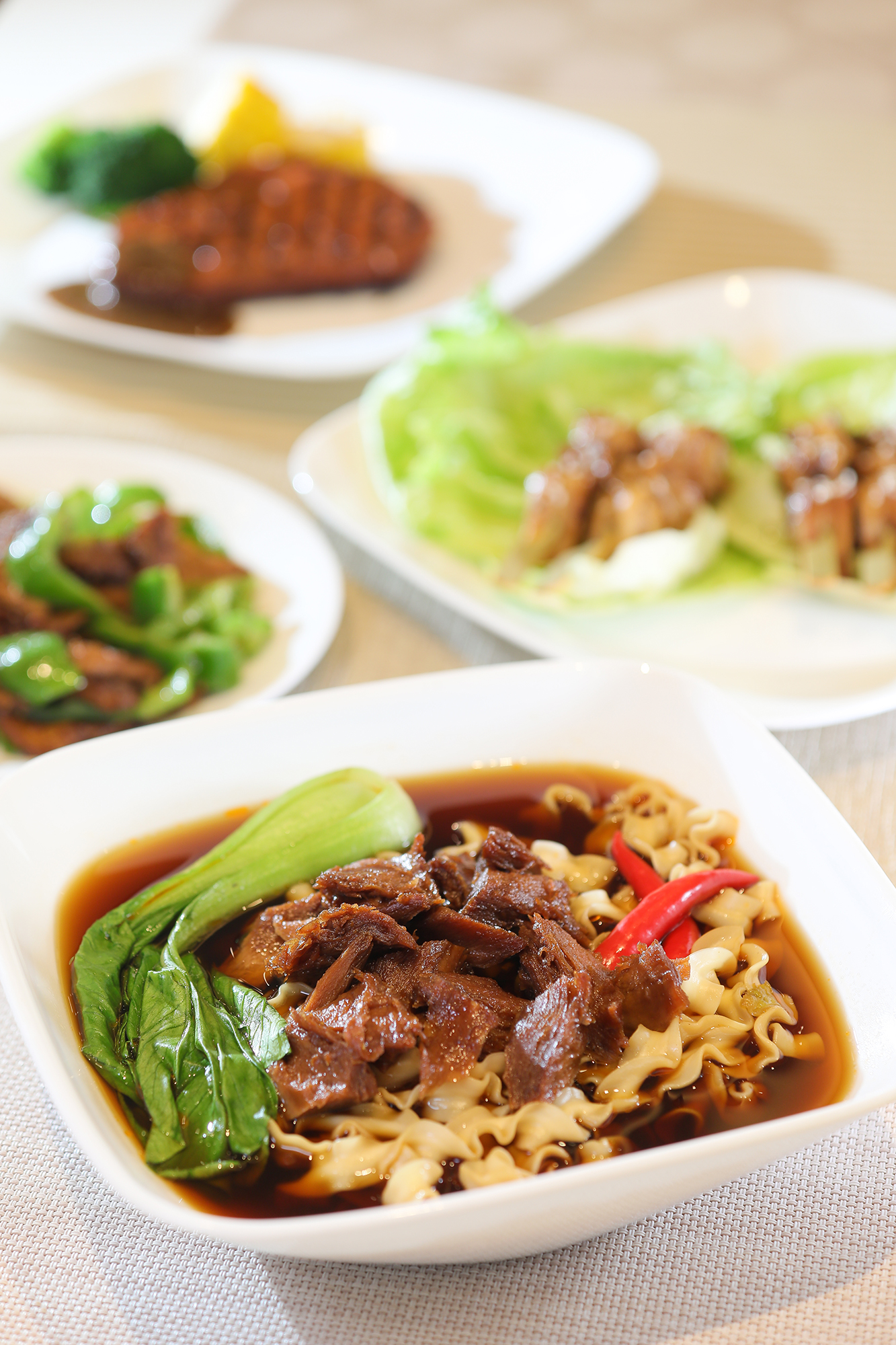
Plant-based meats can be stir fried, pan fried, deep fried, or boiled to make a huge variety of dishes.
Well-developed meat substitutes
The Food Industry Research and Development Institute (FIRDI), located in Hsinchu, holds many of the key technologies underpinning Taiwan’s development of plant-based meats.
When we visit, Dr. Chang Yu-sheng, executive assistant to FIRDI’s director general, immediately brings up global environmental issues. He tells us that according to the United Nations’ Food and Agriculture Organization, livestock farming generates 14.5% of anthropogenic greenhouse gas emissions. The removal of rainforests to clear land for livestock and for the crops to feed them also causes severe environmental damage. Making matters even worse, the UN estimates that the world’s human population will exceed 10 billion people by 2050. How we will feed so many mouths?
Finding meat substitutes has become a top priority for nations all over the world. Chang says that food scientists have proposed mushrooms, insects, algae, fungi, and cultured meats as possibilities, but each has its own shortcomings. “Plant-based meats are the easiest option to produce, and are currently the most competitive.”
Taiwan has advantages in this field. Roughly 13% of our population is vegetarian, a figure second only to that of India. Moreover, our plant-based meat industry has been working to meet the large domestic demand for vegetarian foods for more than 30 years. Chang says that FIRDI develops products and manufacturing equipment, and then transfers them to the local food industry. This cooperation has enabled textured vegetable protein (TVP) produced in Taiwan to become an important part of the international supply chain for plant-based meat.
Hwang Sam-long, a senior research scientist in FIRDI’s Product and Process Reseach Center who has long worked in plant protein research and development, focuses on improving plant-based meat technology and mouthfeel. He says that first-generation products were made from soy proteins that were extruded and processed into dry TVP. The second generation used proteins from a variety of sources, including peas, mung beans, and broad beans, to better simulate the textures of different meats. The third generation hasn’t yet come to market, but will showcase amazing developments when it does. Hwang says: “Current plant-based meat technology generally involves assembling ground ‘meats’ into products. It isn’t well suited to emulating large cuts of meat. But support from a technology development program operated by the Department of Industrial Technology of the Ministry of Economic Affairs has enabled researchers to develop new texturing processes and manufacturing equipment to produce plant-based meats that better replicate the appearance, texture and mouthfeel of real meats. These are world-leading technologies.”
While the US-based company Beyond Meat is the current world leader in plant-based meats, Hwang believes: “Taiwan’s comprehensive industrial chain, desire to exploit the ‘blue ocean’ market for plant-based meats, and third-generation meat technology give us a very strong competitive advantage.”

Jan Jin-ho says that the objective of the Neo Foods brand is to provide non-vegetarians with appealing vegetarian options.
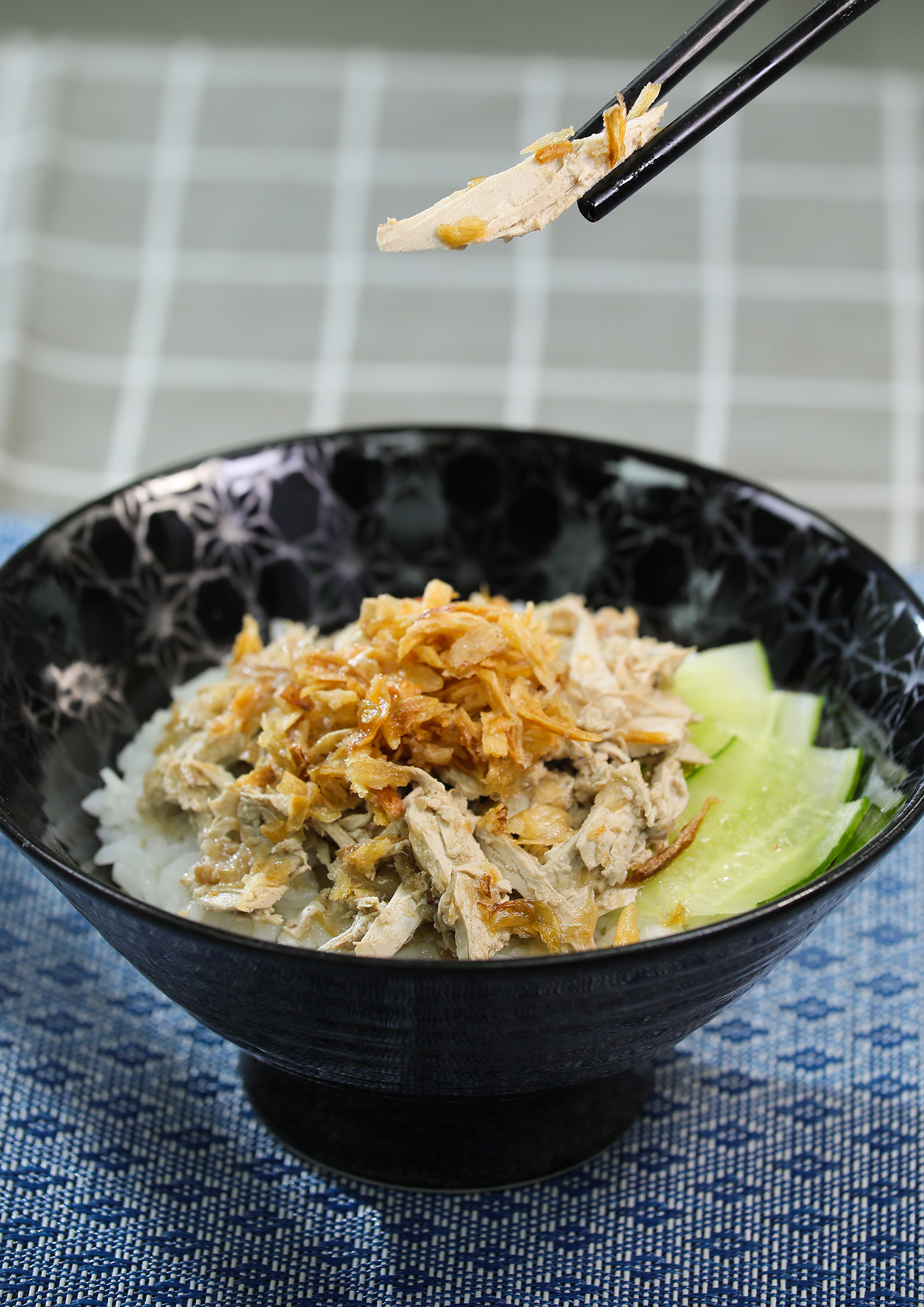
The look, taste, and mouthfeel of Neo’s plant-based shredded “chicken” are almost indistinguishable from the real thing.

Prepared meals are a strong suit of Dachan Great Wall Group, which excels at producing everything from boiled dumplings and tuna–cucumber rolls to meat pies.
Another choice
“Some 5% of the world’s people are vegetarians. It would help the global environment a lot if the other 95% were willing to eat plant-based meats,” says Jan Jin-ho, general manager of Dachan Great Wall Group’s Neo Foods, touching on two key themes in plant-based meats: environmental sustainability and market scale.
One of Taiwan’s top food makers, Dachan was an early participant in the plant-based meats market. It went on to establish its Neo Foods brand in 2021. “We had already seen which way demand was headed.”
Many Taiwanese have religious reasons for their vegetarianism, and so weren’t much bothered by the bean flavor of first-generation vegetarian meats. But when targeting non-vegetarians, companies have to follow a very different strategy. Jan says, “Our team at Neo is always stressing that plant-based meats exist to provide non-vegetarians with another option.”
Neo has developed a variety of meat product formulations built on second-generation technology. “A key point of the second-generation meats is emulation [of the real thing],” explains Jan. “You have to have a deep understanding of the target meat’s flavor and fiber structure to get close.” This greatly increases the difficulty of the task. Companies have worked out many parameters, including temperature, pressure, moisture content, and the speed at which their machines turn to achieve the fiber structure and mouthfeel that they want. Michelle Chao, Dachan’s marketing and public relations manager, says: “We are the company best suited to the job because we understand meat better than anyone! Dachan is one of Taiwan’s key suppliers of white-meat chicken, and has a very solid grasp of the elements that give meat its taste.” Dachan’s flavor lab takes a scientific approach to the research, defining flavors through data rather than simplistic statements like “It tastes good.”
“So far, shrimp has been the hardest to replicate. You have to maintain its springy firmness and flavor, while also preserving the red pattern on the body. It’s really hard—but we’re almost there,” says a beaming Jan.
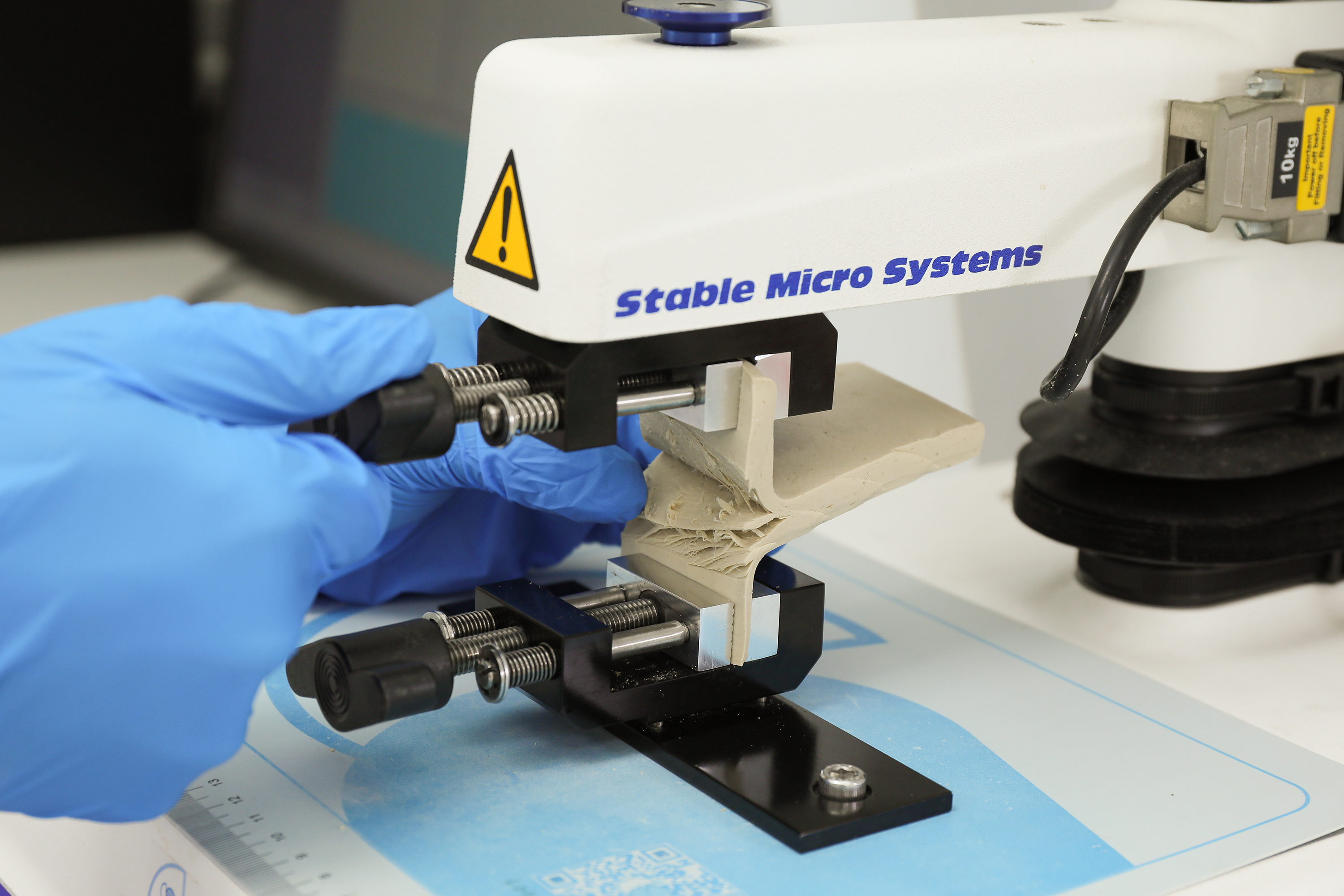
Emulating the mouthfeel of real meat takes specialized equipment that tests the strength of fibers.
Fats, the key to flavor
Huang Jen-yu and Michelle Lee, both of whom earned PhDs from Cornell University in the United States, got started talking about plant-based meats while still students, and realized they could apply what they were learning to founding their own company. Huang studied chemical engineering, wrote his thesis on biomimetics, and was very interested in becoming an entrepreneur. Lee was in the food science department researching fats, and had a strong grasp of key microencapsulation technologies used in food processing. “Fats are a key difference between real meats and plant-based meats, but there is a dearth of appropriate plant-based fats on the market. Since almost nobody in world makes them, we decided to make them our starting point,” says Huang.
Fats provide meat with its juiciness and flavor. But while animal fats are retained in meat during the cooking process, plant fats tend to be lost. “Our technology draws on the idea of encapsulation,” explains Lee. “It encloses liquid plant fats, ensuring that they don’t melt until they reach a certain temperature, which creates a juicy mouthfeel.”
A second issue is that most of the plant-based meats currently on the market use saturated fats, which are not healthy. This prompted Huang and Lee’s company, Lypid, to work with Louisa Coffee to develop something they call “future meats,” which they say are low in cholesterol and trans fats and contain only half as much saturated fat as traditional pork meat.
Lypid developed a purely plant-based fat called PhytoFat™, and in 2021 became a member of IndieBio, an incubator backed by the global venture capital firm SOSV. In 2022, Lypid received US$4 million in seed funding from the Green Generation Fund.
The two founders sited their trial production in Taiwan. They say that this was a bit of a surprise because their investors and clients are all in the US, but Taiwan turned out to be a great match for their company: In their earlier sampling of a large variety of plant-based meats available in the US, nearly every one that tasted good turned out to have been made in Taiwan. “We decided to locate our R&D center in Taiwan,” says Huang, “and soon realized our observations had been spot on: Taiwan is pretty advanced in this area.”
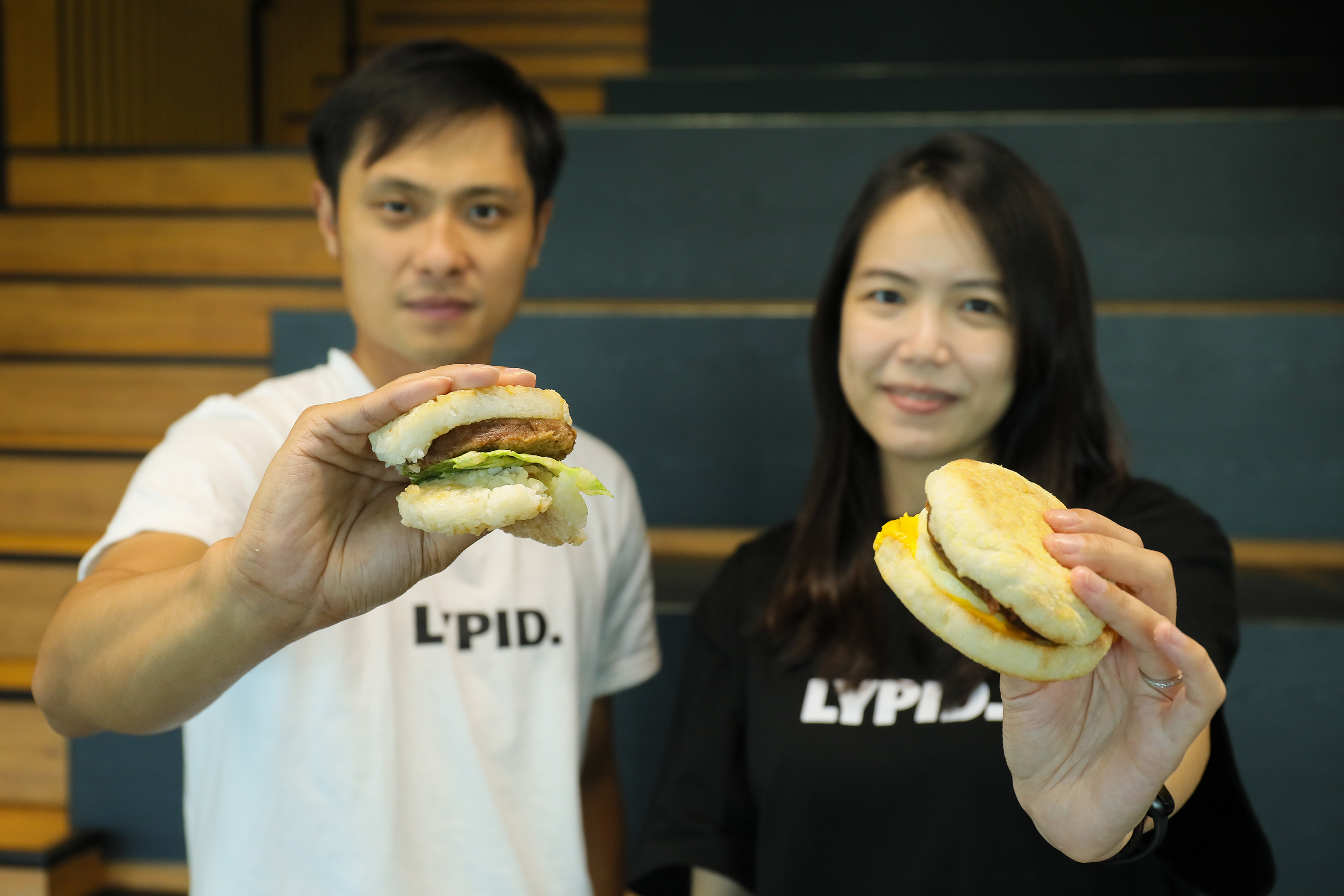
Huang Jen-yu (left) and Michelle Lee (right) founded Lypid to develop plant-based fats. The company uses encapsulation technology to ensure that plant-based meats retain their fats until they reach a given release temperature.
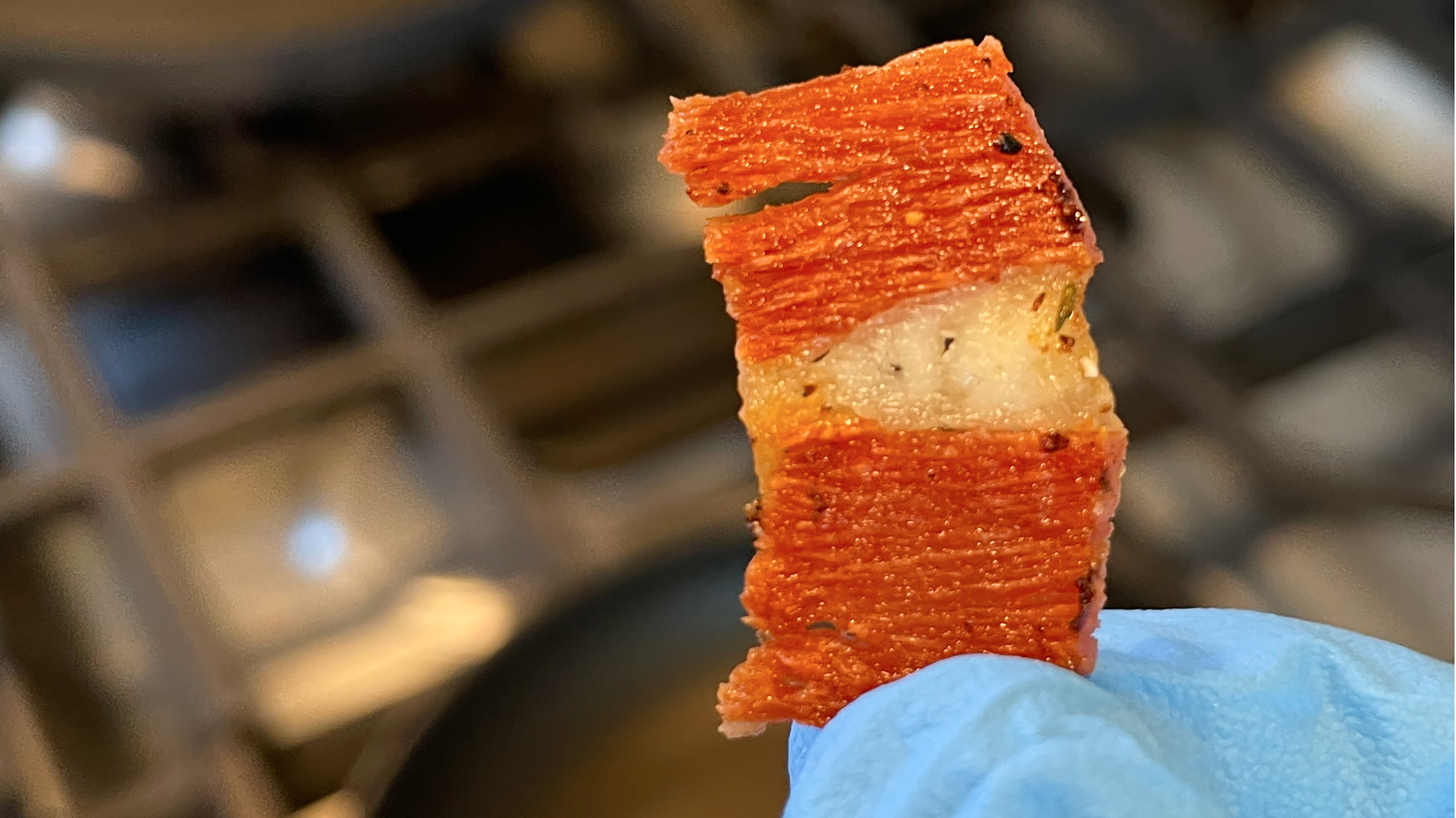
Meats get their juiciness and unique flavors from fats, making fats a key technological hurdle for plant-based meats. (courtesy of Lypid Taiwan)
Environmental friendliness and flavor
Though the discourse around plant-based meats is always closely linked to environmental issues, the human desire for food is primal. Huang says that the key idea driving their R&D is: “I don’t want bettering the environment to mean sacrificing the enjoyment of food.”
Dachan too is focused on making food taste good. Jan Jin-ho says that sanitary restrictions make it difficult for Taiwan to export meat products, but that plant-based products are not subject to the same controls. “Dachan’s strength is in prepared foods. We have a lot of experience preparing and manufacturing non-vegetarian foods.” Jan is aiming to bring prepared versions of Taiwanese dishes to the international home meal replacement market. “We would probably do okay competing in the hamburger space, but feel that we can take a huge lead in Asian foods.”
Chang is optimistic about the outlook for plant-based meats. “The trend is clear, and the plant-based meat market is just getting started.” There have been a number of breakthroughs in food science in recent years, and more and more fields are contributing their expertise, with everyone aiming to make the food industry more sustainable and environmentally friendly.
Is it possible to enjoy delicious food while also protecting the environment? Absolutely! There’s no need to pick one over the other. Plant-based meats have begun to realize their potential and have a very bright future ahead of them. Eating for change is no longer a distant dream. It’s already happening!

Meat-free products are trending in Taiwan, echoing international vegetarian trends.

Plant-based meats offer consumers a real solution to the problem of wanting to enjoy tasty food while also protecting the environment.



@List.jpg?w=522&h=410&mode=crop&format=webp&quality=80)



